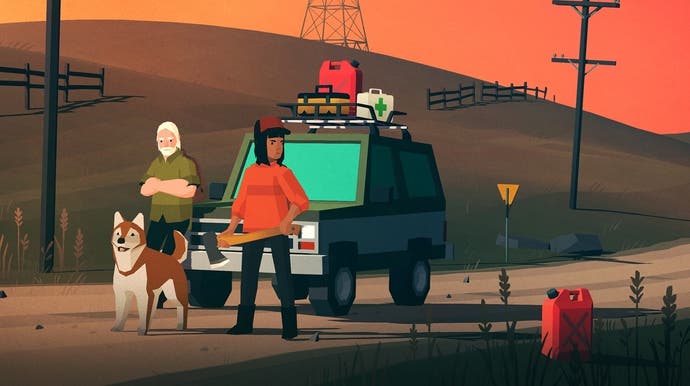I want to play your game but I can't: Overland and its journey with dyslexia
"The way our brains process letters shouldn't be what we are failing at."
Overland is a strategy game about a road-trip across alien-invaded America. It's good but unforgiving. It's not for everyone (I wrote the Overland review). There are people, though, who relish a challenge like this.
Imagine that's you. Imagine Overland is exactly up your street. But then remember you have dyslexia so will find it difficult to read the data you need to in order to secceed. This would be dejecting. This also happened.
Rebecca Saltsman, co-founder and CEO of Finji, developer of Overland, was demoing at PAX East last year when a player came up and said, "I want to play your game. This is totally my genre but I can't play it - I can't read anything on screen because of my dyslexia. The words are too frustrating." (Saltsman relayed this on Twitter.)
"I was fascinated by this," Saltsman said. "I wanted to make Overland accessible. So I asked a lot of questions. I know the science of dyslexia, but at that point I didn't know the accessibility options.
"I came home and asked Adam [Saltsman, director of Overland, and her husband] to put this feature on the dev schedule." And he did - it went in the game.
Get Indie Gaming highlighted Overland's dyslexia mode on Twitter, showing pictures of the game with the feature switched on and off.
What you're seeing is the OpenDyslexic font replacing the game's normal font. It gives the characters a bit more weight at the bottom and spaces them out more. According to the OpenDyslexic website, the font addresses "contrast/blindness, letter confusion or rotation, and crowding" (and note, it's free to use so consider supporting the Patreon if you find it useful or, well, inspiring).
"Subtle differences," said the Get Indie Games Twitter, "and yet a huge spike in readability for my pita brain. This is so very, very awesome to figuratively and literally see this."
Bravo, Finji. It's heartwarming to see. But, of course, accessibility doesn't stop there. "I think about this - and other accessibility options - a lot," said Rebecca Saltsman. "How do we signal that games aren't 'for you?'
"I want people to play. And a lot of play engages with failure - but the way our brains process letters shouldn't be what we are failing at, the way our eyes see color shouldn't be where we fail, the way our bodies can use controls shouldn't be where we fail."
Saltsman's remarks echo a growing awareness within video gaming of providing better accessibility to a wider range of people. Microsoft rightly received plaudits for its work on the Xbox Adaptive Controller, and - judging by patented designs for a blindness-focused Xbox controller - still intends to do more. Also, it's always worth highlighting the incredible work SpecialEffect does, and has done for many years now, making bespoke gaming equipment for people with severe disabilities to play games to their fullest.
Overland is out now on a lot of platforms: Apple Arcade, PC, Switch, PS4 and Xbox One.

